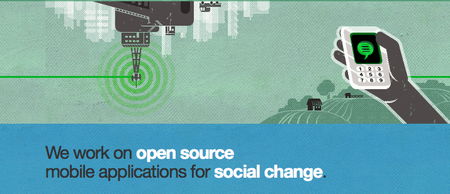On day two of MobileActive ’08 in Johannesburg, I attended Mobile Use By Micro and Small Enterprises (MSEs) by Jonathan Donner of the Technology for Emerging Markets Group, Microsoft Research India.
Microsoft Research does long-term R & D – it’s not tied directly to products. Its goals are to:
- understand potential technology users in developing countries
- adapt/design technology that contributes to socio and economic development of poor communities
Research focus was on tiny informal businesses with less than 5 employees. These businesses are past agriculture and past family farm. Example businesses include basket weaving, fruit stands, informal pipe fittings manufacturing, cooking breakfast.
Donner studied how mobiles have had a positive impact in Kigali, Rwanda in 2002-2004, and Bangalore and Hyderabad, India 2005-2007.
He found: “information needs are very different than those of my colleagues in Redmond.”
Innocent, a neighborhood baker, makes samosas in Kigali. He doesn’t own a stove or an oven, but owns a mobile. And with that he takes orders for wedding cakes. He now owns a house. His mobile has replaced his journeys, broadened his markets, connects buyers and sellers. He couldn’t get a landline because he needed credit.
Afsa, a hair braider in Kigali, got a mobile phone. It tripled her business in a week. Clients gave her number to more prospects. She went from three clients per week to 8-12 per week. She saved for months to buy her phone. She has an emergency fund saved in case her mobile is stolen.
The phone lets them do what they do more effectively and make more money.
In a study of Kerala fishermen, Robert Jensen measured the price of fish before and after cell towers were put up – the price became less variable. So households can pay less for fish because less fish is wasted. The fisherman can count on a certain price.
There’s not much selling baskets on eBay – most transactions are local and trust-based.
Donner visited a scrap business. Their information system is a notebook. They like it. They run on communication, not information. They don’t need any fancy technology. They don’t need a computer – but they had been missing a way to move voice faster then they can walk.
After getting a mobile phone, they could take a lunch break without missing a sale – they increased the metabolism of their environment.
In most SME’s, personal behaviors are interlaced with business behaviors. For example, out of 10 calls, 1/3 may be business related. Mobiles are used simultaneously for business and social reasons. Informations systems are extensions of the personal.
To sum up, voice is the killer app. Existing businesses do better with mobile phones. Mobiles have amplification effects rather than transformative effects.
What’s next in terms of business applications for MSE’s? The key will be external communication. For example, inventory management by suppliers; financial services/mbanking; customer relation management; and advertising. Supply chain, banking, and advertising technologies are what’s next.
SME’s want loans. Mbanking offers a record of transactions that can become credit history.
“Presence web” – this guy can be a point on digital maps via his mobile number and SMS. That breaks down the barriers between internetland and mobileland.
Donner asked SME’s in Bangalore whether they would use SMS to remind people of balances. Many thought SMS was not right to use – too impersonal. You have to line up technology with social practices.



